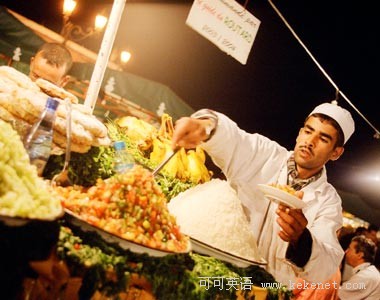
2. Are basic hygiene practices being implemented by the vendor(s)? In Mexico, I've frequently observed street vendors slipping clean plastic bags over plates. With every order, a new bag is used, then discarded at the end of the meal. It's an eco-nightmare, but it's a lot more sanitary than dunking a plate in a bucket of dingy water doubling as a petri dish. Also bear in mind that in many parts of the world, the left hand performs double-duty as toilet paper. I can't say it enough: Look at the sanitation practices before ordering.
2、店家(們)是否有基本的衛(wèi)生習(xí)慣?在墨西哥,我經(jīng)常看到攤販用干凈塑料袋裝盤子。每一個(gè)訂單都使用新的袋子,餐后再把袋子扔掉。雖說(shuō)這是生態(tài)的噩夢(mèng),但卻勝于把盤子扔進(jìn)重復(fù)使用的臟水中而成為細(xì)菌滋生地。我們也應(yīng)記住,世界上許多地方的人是用左手完成如廁動(dòng)作的。我不能說(shuō)這就足夠了,但在下單之前應(yīng)了解其衛(wèi)生狀況。
You'll often find co-workers whose sole responsibility is to handle money, to avoid cross-contaminating food (this isn't always the case, however, so sometimes you'll just have to--literally--suck it up). Once, when I accidentally handed my money to the wrong guy, he turned his hand upside-down to avoid contact with my filthy coins.
你常常會(huì)發(fā)現(xiàn),同事一般都會(huì)自己負(fù)責(zé)給錢,以避免食物的交叉污染(雖并非總?cè)绱耍袝r(shí)你必須按字面意思去做即可)。有一次,我不小心把錢給錯(cuò)了人,結(jié)果他將手翻過(guò)來(lái),避免接觸到我那臟臟的硬幣。













